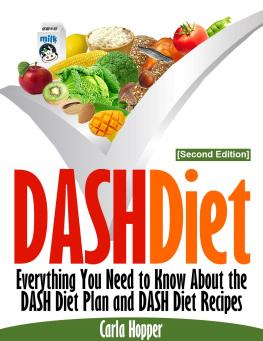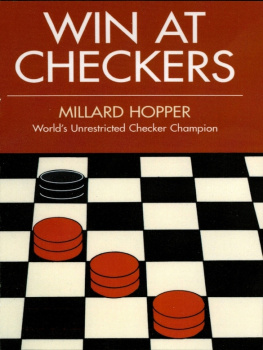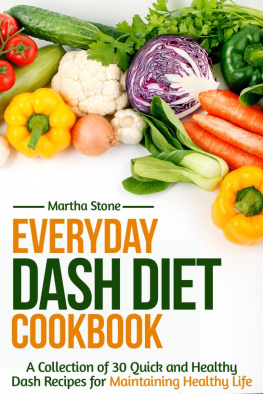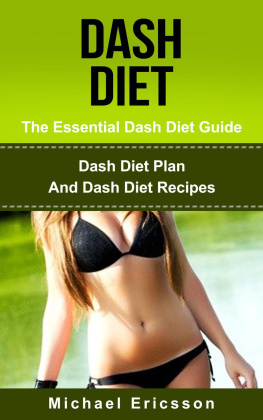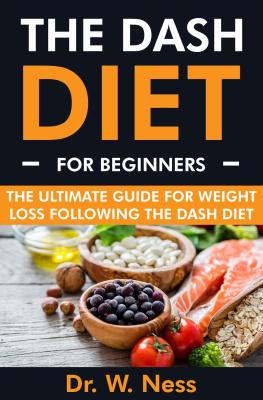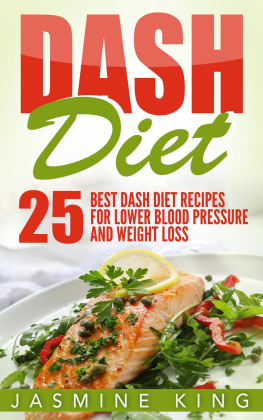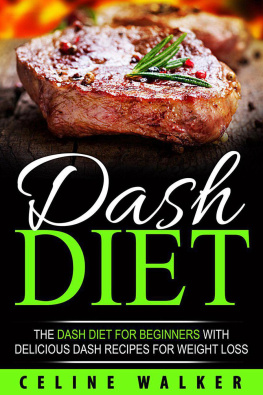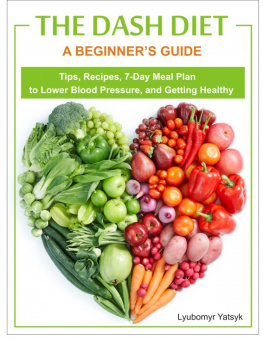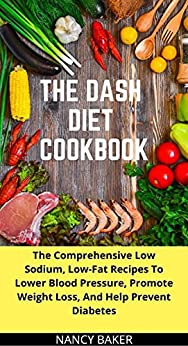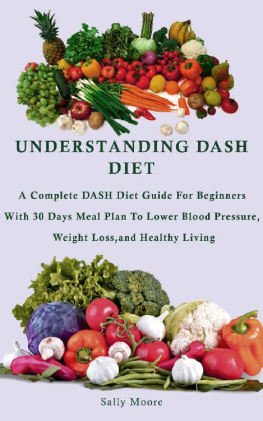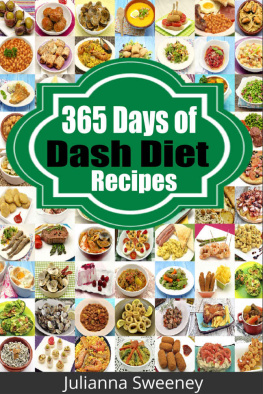Table of Contents
DASH Diet
[Second Edition]
Everything You Need to Know About the DASH Diet Plan and DASH Diet Recipes
Carla Hopper
Copyright 2013 Carla Hopper
All rights reserved.
DASH Diet Introduction
The DASH Diet is an important strategy for anyone who wants to lower their blood pressure and improve their overall health without dealing with risky medications and their side effects. This simple diet focuses on low fat, low cholesterol foods and natural ingredients, making it inexpensive and easy to follow. Plus, you'll be surprised by how delicious heart healthy foods can be. If you've been warned about the possible dangers of high blood pressure and a normal North American diet, it's time to make some changes.
The recipes contained in this book don't encompass the entire range of DASH diet options, but they will give you an idea of how you can change your favorite foods to fit the diet plan. In general, they focus on reducing the fat, cholesterol and refined carbohydrates in a dish without losing out on flavor. If you've experienced too many flavorless health foods, these recipes could be the solution that you've been hoping for.
What Is the DASH Diet?
DASH is a term that stands for Dietary Approaches to Stop Hypertension. It is designed to be a lifestyle change for people who want to treat or prevent hypertension, also known as high blood pressure. The diet is based on studies originally performed by the US National Institutes of Health that examined three different dietary plans and their effects on blood pressure. The result is a plan that focuses on increased consumption of plant foods such as nuts, beans, low fat dairy products, vegetables and fruit.
This diet plan is recommended by the National Heart, Lung and Blood Institute for anyone who wants to decrease their blood pressure and improve heart health. In studies performed on the diet, people who followed it showed a systolic blood pressure reduction of 6mm Hg, as well as a diastolic blood pressure reduction of 3 mm Hg in patients who had tested in the high-normal range, also called pre-hypertension. In patients who had existing hypertension, the diet caused reductions of 11 mm Hg and 6 mm Hg respectively, with no change in body weight. While it was not designed for weight loss, the DASH diet's focus on lower calorie, healthier foods does make it a viable choice for people who want to reduce their body fat levels.
What Is Hypertension and Why Is It Dangerous?
Hypertension, or high blood pressure, refers to the force your blood puts on the walls of your arteries. Doctors measure it in millimeters of mercury, or mm Hg, and record it as two different numbers. They measure both the systolic blood pressure, or the pressure when your heart is beating, and the diastolic blood pressure, or the pressure between beats. A person's blood pressure can rise and fall over the course of a given day, but continued high levels can be very dangerous to your health.
When your blood flows with a lot of force, it can damage the veins and arteries, as well as organs like the eyes, heart, kidneys and brain. Most people who develop high blood pressure have difficulty lowering it. Left uncontrolled, this condition can lead to blindness, kidney and heart disease, and even stroke. About one in three people have high blood pressure, but many aren't aware of the problem.
Many doctors and patients turn to medication at the first sign of high blood pressure, but this technique might not be the right one for you. Many blood pressure treatments have dehydrating effects. Others can induce depression or extreme tiredness. The very low blood pressure that is caused by some drugs can also result in severe dizziness and a tingling feeling in your fingers and toes. In more serious cases, these drugs can cause insomnia, pain in the feet, weakness and leg cramps, or an irregular heartbeat. That's a lot of risk to take when you could address the problem through less intrusive methods like diet and exercise.
How Does the DASH Diet Work?
The DASH diet provides an alternative to conventional, drug-based methods of controlling blood pressure. It is designed to help you maintain a healthy weight with moderate levels of physical activity. It focuses on reducing sodium levels, which have been shown to elevate blood pressure in some people. It also includes decreased levels of saturated fat and cholesterol, which contribute to narrowing of the arteries and can make it hard for blood to cycle properly.
Over time, this diet can help patients who have high blood pressure lower their levels and reduce their medication requirements. In some cases, it can even allow you to discontinue use of medication entirely. It is important to change your dosages only on the recommendation of a doctor, however. Don't stop using your high blood pressure medicine just because you've started using the DASH diet.
Understanding Why Hypertension Occurs
Hypertension, or high blood pressure, is often an "inherited" disorder. In other words, it runs in the family. You may have grandparents and parents with it. Your brother and sister may have it. The reality is the direct cause of high blood pressure is elusive. There has been no gene isolated that marks as a carrier of "hypertension." It is believed that it is a conglomerate of genes that may egg on the propensity to have high blood pressure.
It seems that high salt intake and high blood pressure has some relation. If a person eats a high sodium diet, they may experience hypertension as a result of their choice. The body needs sodium, so going completely no salt is as dangerous as going with too much salt. The key is moderation. Eat low salt foods, and skip salting foods you know are pre-salted. If hypertension is present and a person consumes high salt amounts, their body will be stressed. The kidneys suffer when trying to assimilate the excessive sodium. When this occurs blood flow is restricted, which causes the high blood pressure readings. This happens because the body is trying to save the kidneys by sending more blood to that area, and it restricts blood to other vital areas of the body. Renal failure and high blood pressure often go hand in hand.
Stress is another big reason for elevated blood pressure. It is not whatever stresses you that raises the blood pressure, it is your body's reaction to the stress that raises it. The body produces stress hormones and at times when stress is at the highest the body will release these hormones. The original intent of this is to help the person to have a boost of energy from the increased heart rate to move. This is very similar to the "fight or flight" syndrome, where when the body is in danger, the body reacts with enough energy to both stay and fight physically or to flight or run. However, general stress is not as a result of immediate danger, but more of an irritant of situations and circumstances. A little stress by itself does not harm the body, but if a person stays in a constant state of high stress it becomes dangerous. It becomes a catalyst for the body to release the stress hormone over and over and one of the main side effects to this is high blood pressure.
Whether a person has a genetic leaning to hypertension or whether they are living a highly stressful life, one way of treating hypertension is through diet, through the foods we eat.
DASH Study Daily Nutrient Goals
The studies used to formulate the DASH diet set a few standard daily nutrient goals, which are also used in the main plan. Following this diet means trying to keep your total fat intake to about 27 percent of your daily calories. Saturated fat should make up only about 6 percent of your calories, however. The DASH diet is relatively high in carbohydrates, which should make up about 55 percent of your daily calorie intake, but most of the carbohydrates you eat should be complex ones, rather than those derived from white flour and sugar.

